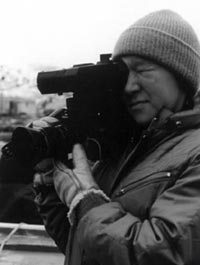History & Background
 Martha Stuart
Communications, C4C's precursor organization, was founded in 1968 as an independent television
production company. From the start, we sought to address the imbalance inherent in centralized control
of media production and dissemination. In exploring less "brokered" forms of communication, we
produced programs centering on individuals speaking directly from their own experience. The ARE YOU
LISTENING series, produced between 1969 and 1985, features people linked by common experience -
village women in Egypt, working mothers, single parents - candidly exchanging their views. This approach
challenged the norm, in which journalists report on an issue or "experts" offer their
opinions.
Martha Stuart
Communications, C4C's precursor organization, was founded in 1968 as an independent television
production company. From the start, we sought to address the imbalance inherent in centralized control
of media production and dissemination. In exploring less "brokered" forms of communication, we
produced programs centering on individuals speaking directly from their own experience. The ARE YOU
LISTENING series, produced between 1969 and 1985, features people linked by common experience -
village women in Egypt, working mothers, single parents - candidly exchanging their views. This approach
challenged the norm, in which journalists report on an issue or "experts" offer their
opinions.
 The participatory
communication approach pioneered by C4C grew out of these experiences in production, as well as from the
opportunities offered by the advent of lighter, portable, battery-powered equipment. During the '70's
and '80's, C4C's work came to focus on helping communities and local organizations speak for themselves
by creating their own, self-representative programs. Also during this time, we came to question the
concept of a communication "product". We consider communication a process - a means, not an
end. This process begins when people work together to plan and produce a videotape that reflects common
concerns; it continues when the tape is shown to other community members to elicit their comments and
generate ideas for collective action. The playbacks often spiral outward, reaching other similar
communities where the tape serves as a catalyst for dialogue and organizing. This direct media speaks
forcefully to people who share the experience and realities of the original community.
The participatory
communication approach pioneered by C4C grew out of these experiences in production, as well as from the
opportunities offered by the advent of lighter, portable, battery-powered equipment. During the '70's
and '80's, C4C's work came to focus on helping communities and local organizations speak for themselves
by creating their own, self-representative programs. Also during this time, we came to question the
concept of a communication "product". We consider communication a process - a means, not an
end. This process begins when people work together to plan and produce a videotape that reflects common
concerns; it continues when the tape is shown to other community members to elicit their comments and
generate ideas for collective action. The playbacks often spiral outward, reaching other similar
communities where the tape serves as a catalyst for dialogue and organizing. This direct media speaks
forcefully to people who share the experience and realities of the original community.
The VVN Experiment
In the early 1980s, a group of participatory video teams, including several C4C partners, formed the Village Video Network. READ MORE about this experiment in international video exchange.
Communication for Change's experience demonstrates the power of media that is conceived and produced by individuals determined to depict their own reality and effect change. Self-representation is profoundly linked with self-determination. As individuals and communities become self-determining, they gain a greater capacity to obtain social and economic justice. They develop the ability to influence local leaders, to encourage decision-makers to be responsive and responsible.
The role of participatory video in this process of empowerment is illustrated by the examples in our Story Gallery.
© Communication for Change, Inc. 2003-2019. All rights reserved.
